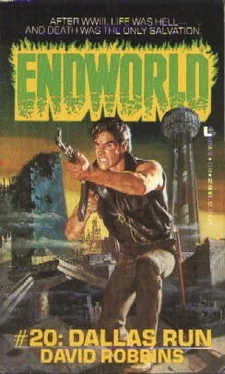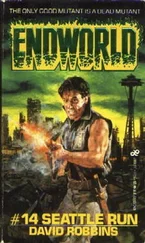David Robbins - Dallas Run
Здесь есть возможность читать онлайн «David Robbins - Dallas Run» весь текст электронной книги совершенно бесплатно (целиком полную версию без сокращений). В некоторых случаях можно слушать аудио, скачать через торрент в формате fb2 и присутствует краткое содержание. Город: New York, Год выпуска: 1990, ISBN: 1990, Издательство: Leisure Books, Жанр: sf_postapocalyptic, Боевая фантастика, на английском языке. Описание произведения, (предисловие) а так же отзывы посетителей доступны на портале библиотеки ЛибКат.
- Название:Dallas Run
- Автор:
- Издательство:Leisure Books
- Жанр:
- Год:1990
- Город:New York
- ISBN:978-0843929386
- Рейтинг книги:4 / 5. Голосов: 1
-
Избранное:Добавить в избранное
- Отзывы:
-
Ваша оценка:
- 80
- 1
- 2
- 3
- 4
- 5
Dallas Run: краткое содержание, описание и аннотация
Предлагаем к чтению аннотацию, описание, краткое содержание или предисловие (зависит от того, что написал сам автор книги «Dallas Run»). Если вы не нашли необходимую информацию о книге — напишите в комментариях, мы постараемся отыскать её.
Dallas Run — читать онлайн бесплатно полную книгу (весь текст) целиком
Ниже представлен текст книги, разбитый по страницам. Система сохранения места последней прочитанной страницы, позволяет с удобством читать онлайн бесплатно книгу «Dallas Run», без необходимости каждый раз заново искать на чём Вы остановились. Поставьте закладку, и сможете в любой момент перейти на страницу, на которой закончили чтение.
Интервал:
Закладка:
“What truth?” Blade inquired, raising his voice to insure he would be heard. He gazed at the speedometer, which turned out to be broken, and estimated they were traveling to the southeast at 50 miles an hour.
“My parents taught me to read at an early age, and one of the few books we owned was the Bible. I spent every free minute reading that precious book, and one day I found the passage that would give meaning to my life,” the Lawgiver said. “Until that day I was an outcast, shunned by everyone but my mother, father, and sister.”
“Your sister?” Blade interrupted.
The Lawgiver’s expression became sad. “Yes, my dearest Esther, long since departed. She was born two years after me, and like me, she bore the Mark.” He paused, frowning, then resumed his tale. “One day I read in Genesis about Cain and Abel. Are you familiar with the Scripture?”
“Cain killed Abel and was sent into exile.”
“That’s only part of the story. Before the Maker sent Cain into exile, the Maker put a mark on Cain so that anyone who met him would know he was under the Maker’s protection,” the Lawgiver said, and quoted from memory. “And the Lord set a mark upon Cain, lest any finding him should kill him.”
“What does this have to do with your plan to convert the world?” Blade inquired.
“Let me finish,” the Lawgiver snapped, and frowned. “When I was reading that story, the idea first occurred to me that there might be a divine purpose behind my own marks. I searched the Scriptures and found other references.” He paused, recalling the passages. “He hath set his bow, and set me as a mark for the arrow.”
Blade studied the Lawgiver’s features, detecting a peculiar, far-off aspect to the elderly man’s eyes.
“And haven’t you read in Ezekiel about the mark the Maker put on his chosen, and how those with the mark were spared?” the Lawgiver went on.
“There are many more I could quote. One of my favorites is from Galatians. ‘I bear in my body the marks of the Lord Jesus.’”
“I think you’re misinterpreting—” Blade began.
“I knew then and there that my curse was really a blessing,” the Lawgiver said, cutting the Warrior off. A gleam came into his eyes and he smiled serenely. “Instead of being afflicted, I was truly blessed. The Maker had selected me to establish the kingdom of heaven on earth. All the proof I needed, all the clues to the special relationship I enjoyed with our Maker were right there in Scripture for anyone to read.” He chuckled, and quoted more passages. “I have made a covenant with my chosen. Even him whom he hath chosen will he cause to come near to him. I have exalted one chosen out of the people.”
An uneasy feeling gnawed at Blade’s mind. He knew, from past experience, that those who were affected by madness were totally unpredictable and supremely dangerous, and he saw in the transported countenance of the Lawgiver every indication that the man was pathologically demented.
“Where is God my Maker, who giveth songs in the night?” the Lawgiver asked. “What does Psalm Sixty say? Oh, yes. ‘Thou hast made us to drink the wine of astonishment.’” He giggled inanely.
“So you decided those green splotches meant you had a spiritual purpose to fulfill?” Blade asked, hoping to prompt the Lawgiver into continuing the narrative.
“There was no room for doubt. I bore the Mark of the Chosen, and since we were instructed to be fruitful and multiply, I did exactly that. Esther and I had nine children, and all nine were exactly like us.”
“You took your sister as your wife?”
“There was no one else to take,” the Lawgiver said. “It took me over a year to convince her of the righteousness of my cause, but eventually she came around. We went off by ourselves and hid in the woods, and while we were there I found the secret.” He rubbed his palms together gleefully.
“What secret?”
“You’ll see shortly,” the Lawgiver said, and lapsed into silence.
Blade faced forward and placed his hands on the dash. Several questions had been answered, but pieces of the puzzle remained. He now knew that the Chosens’ religious beliefs stemmed from the Lawgiver’s interpretation of key passages in the Bible, an interpretation warped by the vindictiveness of a man who couldn’t tolerate being born “different,” a man branded by more than the green splotches on his body, a man who had to justify his existence by inventing a special link to Deity. He also knew the core of the Chosen were composed of the Lawgiver’s own family.
But the knowledge didn’t explain how the Lawgiver was able to convert those who weren’t born with the marks. And the knowledge didn’t explain how the Lawgiver could maintain his sway over those who were converted.
It wasn’t as if the Chosen were zombies.
They drove to the south for seven more miles, encountering fewer and fewer structures the farther they went. Finally the convertible climbed a hill, and the driver braked and pulled over to a weed-choked curb on the left.
Blade surveyed the landscape. On the right was a sloping field. On the left, next to the curb, stood a sign partly destroyed by the passage of time and the ravages of the elements. It bore the words CHEMITEX, INC.
“Get out,” Aaron ordered.
The Warrior climbed from the convertible, and the guards fanned out, encircling him.
“Come with me,” the Lawgiver said, beckoning with his right arm.
Blade moved toward the curb, the guards parting to permit him to walk alongside their leader. As they walked, four large structures materialized below the crest of the hill. All were enclosed within a chain-link fence. A narrow path ran from the curb down to the fence, a distance of approximately 50 yards.
“My home,” the Lawgiver said, nodding at the complex.
“You live here?” Blade asked in surprise.
“I did when I was younger. My family lived here for over thirty years.”
“But why live at a chemical compound on the outskirts of the city when there are nice homes in Dallas for the taking?”
“My parents settled here a year before I was born for a variety of reasons. First, it’s relatively isolated, on the outskirts as you pointed out, and the gangs, the Chains and the Stompers, seldom venture out this far.
Second, the scavengers and the looters rarely bother with industrial facilities because there’s not much worth taking. Third, it’s not too far out.
My parents could sneak into the city and hunt for supplies.”
“Your folks lived here like hunted animals?”
“It’s not that bad,” the Lawgiver said. “See for yourself.” He headed down the path.
Blade followed, scrutinizing the complex. The path led to a split in the chain-link fence. Three of the buildings at the site were rectangular in shape, while the fourth was square. On the opposite side of the CHEMITEX plant, in the center of the fence, stood a closed metal gate.
Beyond the gate an asphalt access road meandered for seven hundred yards before connecting with a street. “Why didn’t we drive in the front gate?” he asked. “Why go in the back way?”
“It’s a security precaution,” answered Aaron, who walked behind the Warrior. “We don’t want to draw attention to the facility, which we would if we drove up to the front gate. And from the top of the hill we can see for miles. If anyone tailed us, we’d see them.”
“I take it you come here often,” Blade commented.
“Quite often,” Aaron confirmed.
“But why, when you’ve taken over that stadium as your headquarters, as your Temple?”
“The Bowl serves as our temple of worship and for other activities,” Aaron said, “but we can’t obtain the Elixir of Life there.”
“Why do you call the stadium the Bowl?”
Читать дальшеИнтервал:
Закладка:
Похожие книги на «Dallas Run»
Представляем Вашему вниманию похожие книги на «Dallas Run» списком для выбора. Мы отобрали схожую по названию и смыслу литературу в надежде предоставить читателям больше вариантов отыскать новые, интересные, ещё непрочитанные произведения.
Обсуждение, отзывы о книге «Dallas Run» и просто собственные мнения читателей. Оставьте ваши комментарии, напишите, что Вы думаете о произведении, его смысле или главных героях. Укажите что конкретно понравилось, а что нет, и почему Вы так считаете.












